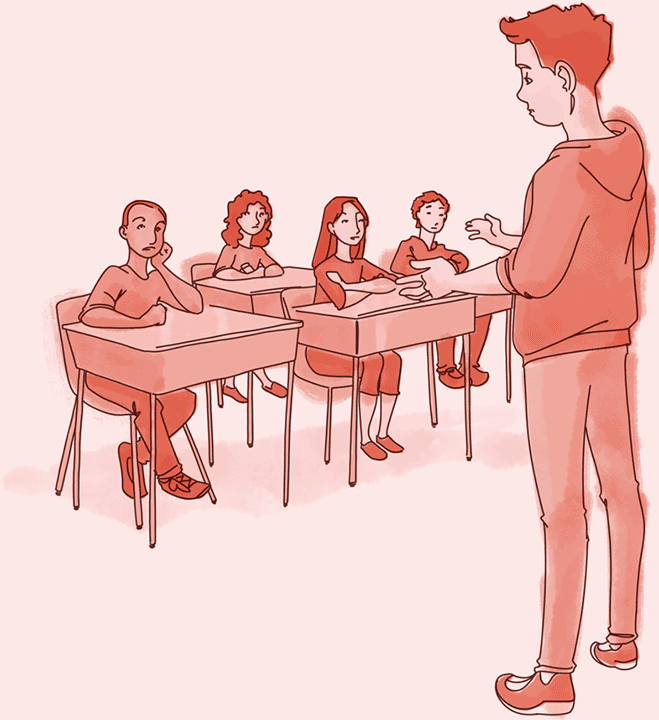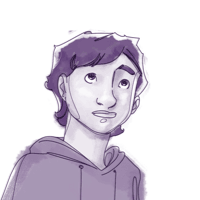School & Peers

Is school a “getaway” for you—a place where you can just be a normal kid—without thinking about ALS?
Is school stressful? Do you worry about your family member while at school?
Students told us what it is like to live with ALS in the family, and try to live a “normal” life at school. Some feel isolated from other kids who do not have a family member with ALS, while others feel loads of support and help at school.
Talking about ALS in school can be complicated
To find a balance, many students find a way to incorporate ALS into their school—primarily by talking to their classmates or presenting a report on ALS to their class.
When a 13-year-old who has a father with ALS was asked to present on ALS in his school, he was really nervous at first. He had not talked very openly in the past and did not know how his fellow students would take the conversation. But, after he talked it out with his teacher, he decided to open up to his class because he realized his fellow students really did not understand ALS and its impact on the family, and who would be better to tell them than him? In the end he was glad he did it. It actually made him feel better.
When we ask students about school and ALS, kids who had talked to friends and fellow students said talking was very helpful. Here is why:
- You can take ownership of ALS in your life, while talking with peers and school staff. By telling your story, you can help your peers better understand ALS and how it can impact families.
- You have the power share as much information—or as little—as you feel comfortable.
- By getting out ahead of any questions they may have or gossip about your mom, or dad, or grandfather—you get to start the conversation.
If you are thinking about doing a talk or a presentation—where do you go for information?
Ask The ALS Association! The ALS Association can be a valuable tool in providing information, details, and charts about ALS for you to use. You may also want to think about talking to your family member’s doctor or other health care professional about ALS, treatment, and dealing with ALS.
- What would it look like if you gave a presentation about ALS? Have you already done it? How can you help other students who might want to give a presentation about ALS?

Presentations also bring awareness
Some of the students who gave a presentation found out that their peers were really curious and actually wanted to do something about ALS! In fact, giving a talk in school has led to:
- Walks for ALS—some of these have been conducted with the whole school getting involved.
- Bake sales—kids get to show off their cooking skills and raise money and awareness.
- Sporting events—I have seen basketball tournaments, Frisbee, triathlons, and flag football—you name it! If it is sport, i be done to help raise awareness and support for ALS!</li>
Giving a presentation, creating a fundraiser, and raising awareness can be a lot of fun and a great way to engage the school, your peers, and your whole community. As a side benefit—it can also bring together families! But…
What if I don’t want to talk to teachers or others at the school?
It’s OK if you aren’t comfortable talking to teachers or school staff right away. In fact, many teens say they would never just go and talk to a teacher—it feels so weird to do that. If this sounds like you –write down a list of reasons or thoughts about why you aren’t ready to talk about it. Go back to the list after a few days or weeks and see if things have changed.
Some students have mentioned these reasons for not wanting to talk to people at school:
“…I feel like they wouldn’t understand”
“I don’t like talking about it at school and stuff because it just…I try not to…it’s hard”
Other students mention feeling separated from their peers and not wanting to be singled out. School is a place where you are a kid, a friend, a student—not a caregiver or someone who is an ‘other.’ It is tough to try and always explain to people what your home life is like.
The truth is, many, many students have home lives that are not necessarily “normal” for a variety of reasons. Talk about this with your family or a trusted friend. Maybe include the teacher to see what they think about it. It may be helpful.
Actually, if you think about it—what is normal? Everybody has something. You aren’t required to visit the school social worker or talk to your teachers about your family member with ALS, but it can be helpful to have the school know what is going on, so they can offer you support. School personnel are required to keep these conversations confidential, so you don’t need to worry about other students finding out about what you discuss in private. And sometimes it’s helpful to talk to another adult who isn’t related to you or involved in the situation.
Bullying. Bullies exist, and they target people for a variety of reasons:
- they feel inferior about themselves;
- they come from a tough home life, so they take it out on others;
- they have been abused, so they abuse others;
- they have a health issue themselves and don’t want to appear weak.
Sometimes, kids who have a parent with an illness can be bullied. Some of your classmates and peers can be super supportive, but others can just be mean. Getting the story of ALS out there before someone has a chance to make fun of you, or your family, might be beneficial in helping everyone process ALS.
If you are being bullied, for any reason, talk to someone about it (teacher, parent, family, etc.). You deserve to not be bullied and have as many people as possible support you.
Talking to Friends
“It would be nice just to have a friend who gets it, I mean about ALS. Someone who I don’t have to always explain everything. ”
This 16-year-old is right on. We all need someone who understands us and gets what we are going through—including living with ALS in the family.
Friends are super important in your life. Some people have many friends, and others have a few close friends. Regardless of how many friends you have, they play a really important role in your life, helping you see the world in different ways, as well as understand how you fit in the world.
How do you talk to your friends?
Andrea, a 15-year-old, tells us how she can tell her friends everything. She “completely trusts them.” They know what’s happening, and how ALS has impacted her life.
Finding friends is so important—particularly at this time in your life. You don’t need a lot of friends; some people only need one. The important thing is to find someone to talk to who is your age. Many teens talk about how important it is to talk to someone their own age who makes them feel just a bit more “normal”.
This is definitely easier said than done. It’s not easy to put yourself out there to meet new people. Attending an event with your local ALS Association chapter is a good place to get to know other people who ‘’get it.” Check in with your local chapter, or ask your parents.
- How do you talk to friends? What are some options to figuring out how to talk to friends?
-

Lara
Lara has some really great friends, some of whom she has known her whole life. She and her friends are all part of the same, tight-knit community and know each other’s families well. They go to the same community center and religious services. Her friends had heard that her uncle was having some health problems, but they didn’t know it was ALS. Because of their shared community, they all understood that it can be hard to talk about things within your family—mostly because their families are the same way. They listened to Lara and were supportive, which made Lara feel less alone.
-

Bradley
Bradley decided to talk to his best friend, Craig, about his dad’s ALS diagnosis when they were riding their bikes through town. Bradley thought it would be a hard thing to talk about, but it helped that they were just riding their bikes like always—it wasn’t like a scheduled, sit-down conversation, which would have made Bradley feel weird. Craig asked a couple of questions about what ALS was, and Bradley was able to share some of the information he had learned while at one of his dad’s medical appointments. Craig offered to help Bradley with homework or taking extra notes if Bradley ever had to miss classes to help out at home. Bradley felt better after sharing his news and having someone else know what he was going through.
-

Ian
Ian decided to talk to a few of his close friends about his dad’s declining health. They all knew his dad had ALS, and Ian was really open about it. But he had not talked about how bad things had gotten. Ian helps his family a lot during the week, and his mom has a respite worker come in on the weekends to help out and give them a break. Ian went to basketball practice and told them that things were rough with his dad’s new meds and being up late to help his mom. His friends offered to help Ian with his homework and checked in the next week to see if things were better. It was helpful for Ian to have his friends listen and be supportive.
Continue the Journey
Caregiving